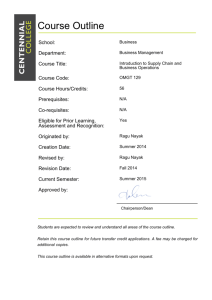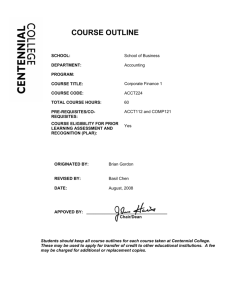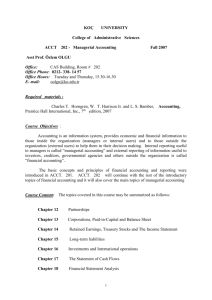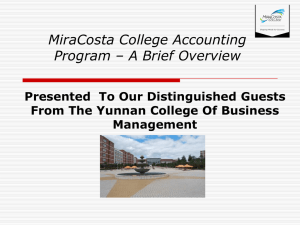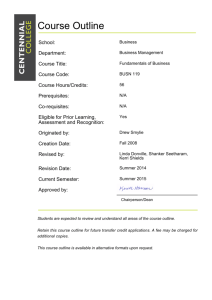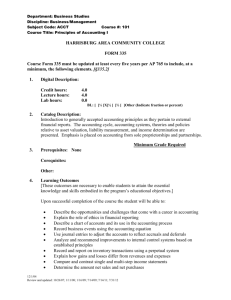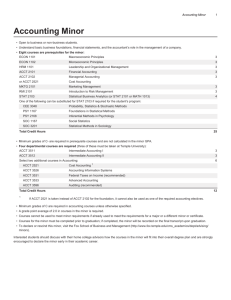Course Outline
advertisement
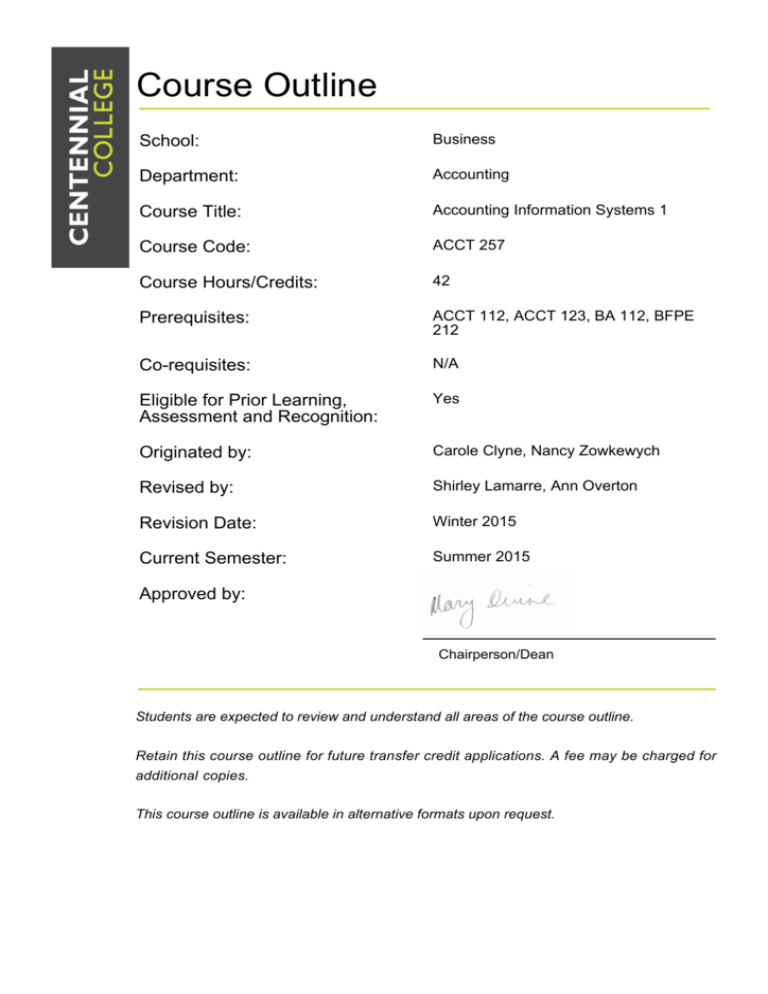
Course Outline School: Business Department: Accounting Course Title: Accounting Information Systems 1 Course Code: ACCT 257 Course Hours/Credits: 42 Prerequisites: ACCT 112, ACCT 123, BA 112, BFPE 212 Co-requisites: N/A Eligible for Prior Learning, Assessment and Recognition: Yes Originated by: Carole Clyne, Nancy Zowkewych Revised by: Shirley Lamarre, Ann Overton Revision Date: Winter 2015 Current Semester: Summer 2015 Approved by: Chairperson/Dean Students are expected to review and understand all areas of the course outline. Retain this course outline for future transfer credit applications. A fee may be charged for additional copies. This course outline is available in alternative formats upon request. ACCT 257 CENTENNIAL COLLEGE Accounting Information Systems 1 Course Description This course will provide accounting students with basic knowledge of information systems that will enable them to examine business processes. Emphasis will be placed on information and document flows; internal control; business processes, the analysis design and development of accounting systems; and using databases. Instructional strategies include assignments, quizzes, group presentations, a midterm and a final comprehensive examination. Program Outcomes Successful completion of this and other courses in the program culminates in the achievement of the Vocational Learning Outcomes (program outcomes) set by the Ministry of Training, Colleges and Universities in the Program Standard. The VLOs express the learning a student must reliably demonstrate before graduation. To ensure a meaningful learning experience and to better understand how this course and program prepare graduates for success, students are encouraged to review the Program Standard by visiting http://www.tcu.gov.on.ca/pepg/audiences/colleges/progstan/. For apprenticeship-based programs, visit http://www.collegeoftrades.ca/training-standards. Course Learning Outcomes The student will reliably demonstrate the ability to: 1. Describe key issues associated with the application of Information Systems (IS) for the accounting function in business organizations. 2. Apply systems techniques to analyze, design and document systems and subsystems relationships 3. Explain the use of the Internet, intranets and e-commerce technology in business practices, and the related systems control requirements 4. Classify the key aspects of information security systems and how they are used to thwart the risks and threats associated with business processes 5. Analyze core business practices and processing systems and understand how they are implemented and controlled in Accounting Information Systems (AIS 6. Explain the systems planning and analysis life cycle – the development, implementation, operation and management of AIS Essential Employability Skills (EES) The student will reliably demonstrate the ability to*: 1. Communicate clearly, concisely and correctly in the written, spoken, and visual form that fulfills the purpose and meets the needs of the audience. 4. Apply a systematic approach to solve problems. 5. Use a variety of thinking skills to anticipate and solve problems. 6. Locate, select, organize, and document information using appropriate technology and information systems. 7. Analyze, evaluate, and apply relevant information from a variety of sources. 9. Interact with others in groups or teams in ways that contribute to effective working relationships and the achievement of goals. 10. Manage the use of time and other resources to complete projects. 11. Take responsibility for one's own actions, decisions, and consequences. *There are 11 Essential Employability Skills outcomes as per the Ministry Program Standard. Of these 11 outcomes, the following will be assessed in this course. THIS COURSE ADHERES TO ALL COLLEGE POLICIES (See College Calendar) 2 ACCT 257 CENTENNIAL COLLEGE Accounting Information Systems 1 Global Citizenship and Equity (GC&E) Outcomes The student will reliably demonstrate the ability to*: 5. Identify and challenge unjust practices in local and global systems. 6. Support personal and social responsibility initiatives at the local, national or global level. *There are 6 institutional Global Citizenship & Equity outcomes. Of these 6 outcomes, the following will be assessed in this course. Text and other Instructional/Learning Materials Text Book(s): Core Concepts of Accounting Information Systems, Canadian Edition, Simkin, Rose, et al; Wiley ISBN 978-1-118-73810-8 Go! with Microsoft ACCESS 2013 Brief, Gaskin, McLellan, Pearson, ISBN 0-13-341450-7 Evaluation Scheme ➮ ➮ ➮ ➮ ➮ Assignments: Assignments Quizzes: Quizzes - in class and online Mid Term: Term Test Group presentation: In class group presentation of assigned project Final exam: Comprehensive final exam Evaluation Name Assignments Quizzes Mid Term Group presentation Final exam Total CLO(s) EES Outcome(s) 1, 2, 3, 4, 5, 6 1, 4, 5 1, 2, 3, 4, 5, 6 4 1, 2, 3 4, 6, 7 2, 3, 5, 6 9, 10, 11 1, 2, 3, 4, 5, 6 1, 4, 5 GCE Outcome(s) 5, 6 5, 6 5 6 5, 6 Weight/100 10 10 30 10 40 100% If students are unable to write a test they should immediately contact their professor or program Chair for advice. In exceptional and well documented circumstances (e.g. unforeseen family problems, serious illness, or death of a close family member), students may be able to write a make-up test. All submitted work may be reviewed for authenticity and originality utilizing Turnitin®. Students who do not wish to have their work submitted to Turnitin® must, by the end of the second week of class, communicate this in writing to the instructor and make mutually agreeable alternate arrangements. When writing tests, students must be able to produce official College photo identification or they may be refused the right to take the test or test results will be void. Student Accommodation It is College Policy to provide accommodation based on grounds defined in the Ontario Human Rights Code. Accommodation may include modifications to standard practices. Students with disabilities who require academic accommodations must register with the Centre for Students with Disabilities. Students requiring accommodation based on other human rights grounds should talk with their professors as early as possible. Please see the Student Accommodation Policy. THIS COURSE ADHERES TO ALL COLLEGE POLICIES (See College Calendar) 3 ACCT 257 CENTENNIAL COLLEGE Accounting Information Systems 1 Use of Dictionaries • Dictionaries may be used in tests and examinations, or in portions of tests and examinations, as long as they are non-electronic (not capable of storing information) and hard copy (reviewed by the invigilator to ensure notes are not incorporated that would affect test or examination integrity). Program or School Policies N/A Course Policies Lab work component using ACCESS 2013 CGA/CPA course transfer credit: Requires a final exam at the end of the course For the Group presentation, group members will share the same grade. It is the group's responsibility to ensure that the tasks are divided equitably and that each member makes the required contribution to the presentation. College Policies Students should familiarize themselves with all College Policies that cover academic matters and student conduct. All students and employees have the right to study and work in an environment that is free from discrimination and harassment and promotes respect and equity. Centennial policies ensure all incidents of harassment, discrimination, bullying and violence will be addressed and responded to accordingly. Academic honesty is integral to the learning process and a necessary ingredient of academic integrity. Academic dishonesty includes cheating, plagiarism, and impersonation. All of these occur when the work of others is presented by a student as their own and/or without citing sources of information. Breaches of academic honesty may result in a failing grade on the assignment/course, suspension or expulsion from the college. For more information on these and other policies, please visit www.centennialcollege.ca/aboutcentennial/college-overview/college-policies. Students enrolled in a joint or collaborative program are subject to the partner institution's academic policies. PLAR Process This course is eligible for Prior Learning Assessment and Recognition (PLAR). PLAR is a process by which course credit may be granted for past learning acquired through work or other life experiences. The PLAR process involves completing an assessment (portfolio, test, assignment, etc.) that reliably demonstrates achievement of the course learning outcomes. Contact the academic school to obtain information on the PLAR process and the required assessment. THIS COURSE ADHERES TO ALL COLLEGE POLICIES (See College Calendar) 4 ACCT 257 CENTENNIAL COLLEGE Accounting Information Systems 1 This course outline and its associated weekly topical(s) may not be reproduced, in whole or in part, without the prior permission of Centennial College. THIS COURSE ADHERES TO ALL COLLEGE POLICIES (See College Calendar) 5 ACCT 257 CENTENNIAL COLLEGE Accounting Information Systems 1 Topical Outline (subject to change): Week 1 2-3 4 5 Topics Readings/Materials Weekly Learning Outcome(s) Accounting Chapters 1 and 2 (Core Information Systems Concepts) and the Accountant Information Technology and AISs •Explain the relevance of accounting information and its impact on systems •Explain the difference between information and data •Be aware of the integration of accounting & information technology •Be familiar with suspicious activity reporting. •Analyze organizational structures and state how the interdependence of functional areas affect financial performance Data Modeling Chapter 3 - Core Apply database design decisions to user concepts requirements: Chapter 1 - Getting •Review database concepts & terms Started with MS •Apply database design decisions to user ACCESS 2013 requirements (Projects 1A and 1B) •Document & interpret business requirements using the REA data modeling technique (emphasizing the 1:1 & 1:M relationships between entities) •Design & create database tables according to business requirements Organizing & Chapter 4 (Core Apply Database design: Manipulating the Data Concepts) •Describe the goals of data normalization in Databases •Create & document a set of normalized Sort and Query a MS ACCESS: Chap 2 - database tables (a schema) from business database Projects 2A and 2B requirements Database Forms and Reports Chapter 5 (Core Concepts) Instructional Strategies Lecture/ Discussion Demonstration/Case Analysis: Test Yourself Questions (all) - Chapters 1 and 2; Discussion questions 21 to 2-11; On line searches – Annual Reports; Case 1-19 Lecture, demonstration, lab use of MS Access Test Yourself Questions (all) - Chapter 3 Problems 3-14, 3-15, 316 ACCESS - Project 1A and 1B Evaluation Evaluation Name Date Assignment problem 2-24 (Due Week 3); Project 1G Due Week 4; Quiz - Core Concepts Chaps 1 and 2 Lecture, demonstration, ACCESS lab Project 2G use of MS Access Student Scholarships Test Yourself Questions Due Week 6 (Chapter 4) Unstructured reporting via user-specified Discussion questions 4queries: 1 and 4-10 •Record, modify and query data to select ACCESS Lab work: outputs from one or more tables according to Projects 2A and 2B business criteria •Describe how structured query language is useful to audit requirements Construct forms and reports Lecture, demonstration, Quiz - Core Efficient, accurate data entry lab use of MS Access Concepts •Design an input form that can be used to Chapters 3 create new records from both single and Test Yourself Questions and 4 multiple tables 5-1 to 5-9 Pre-defined output reporting THIS COURSE ADHERES TO ALL COLLEGE POLICIES (See College Calendar) 6 ACCT 257 Week 6 CENTENNIAL COLLEGE Topics Documenting Accounting Information Systems Readings/Materials Chapter 6 (Core Concepts) 7 Accounting Information Systems and Business Processes 1 8 Accounting Information Systems and Business Processes II 9 Group presentation 10 Introduction to Internal Core Concepts: Control Systems Chapter 9 Weekly Learning Outcome(s) Design and create reports including calculated fields and grouped data Explain the importance of end user documentation •Identify key users of systems techniques •Be able to “draw” simple document flowcharts and explain how they describe the flow of data in AIS •Illustrate knowledge of systems and program flowcharts Core Concepts Chapter •Define primary and supporting business 7 processes of a business model •State why planning and AIS begins with the MS ACCESS - Chapter design of outputs 3 - Project 3A •Give reasons why businesses choose outsourcing and offshoring of business processes •Compare Processing Mode (Batch versus Online) Core concepts •State the objectives, inputs and outputs of Chapter 8; the resource management, production, finance, sales and purchasing processes MS ACCESS - Chapter •Show how companies use business process 3 - Project 3B reengineering (BPR) to cut costs and improve their operational efficiency Presentation Develop presentation and communication skills •Give examples of the difference among preventive, detective and corrective controls •Apply some of the control activities that should be included in an organization’s internal control system •Examine the WebTrustSM/TM Principles and Criteria •Compare automatic versus manual control •Demonstrate data integrity, privacy, confidentiality, and security principles THIS COURSE ADHERES TO ALL COLLEGE POLICIES (See College Calendar) Accounting Information Systems 1 Instructional Strategies Evaluation Name Evaluation Date Lecture/Discussion/De monstration of flowcharting Assignment (one of the following)(Due Week 8) Test Yourself Questions Problem 6-13 Problem 6-14 Problem 6-15; Mid Term Test - Chaps 1-5 Lecture/Discussion Assign topic(s) Case Analysis and Lab for Group work Presentations in week 9 Test Yourself Questions 7-1 to 7-11 Case 7-19 MS Access Project 3A Lecture/Discussion Case Analysis Test Yourself Questions 8-1 to 8-9 ACCESS Lab: Project 3B Group work and presentation Quiz Chapters 6 and 7 Case 8-17 Due week 9 Group evaluation Weight: 10% Lecture/Discussion Case Analysis Test Yourself Questions(all) Problem 9-15 7 ACCT 257 Week CENTENNIAL COLLEGE Topics Readings/Materials 11 Computer Controls for Core Concepts Organizations and Chapter 10 Accounting Information Systems 12 Computer Crime, Fraud, Ethics and Privacy Core Concepts Chapter 11 Chapter 12 Information Technology Auditing Weekly Learning Outcome(s) Accounting Information Systems 1 Instructional Strategies Evaluation Name Lecture/Discussion Quiz Case Analysis Chapters 8 Test Yourself Questions and 9 (all) Case 10-23 Evaluation Date •State the difference among various types of accounting and enterprise software •Identify enterprise-level controls for organizations and why they are essential for corporate governance. •Explain how organizations deal with IT general security and control issues for wireless technology, networked systems and personal computers. Explain the importance of ethical behavior Lecture/Discussion within the environment of computerized AIS Case Analysis Test Yourself Explain the difficulty of defining computer Questions(All) crime and the absence of good data on Problems 11-15, 11-16; computer crime Case 11-18 Be familiar with the proper controls need for preventing computer crime Explain the IT auding process Discuss how to evaluate the effectiveness of information systems controls (risk assessment) Identify the IT auditor's toolkit including auditing software (GAS)and automated working papers Explain the difference between auditing around the computer and auditing through the computer Describe the five techniques that auditors use to audit a computerized AIS: - Use of test data, integrated test facility and parallel simulation to test programs; -use of audit techniques to validate computer programs including test of program change controls -use of logs to review of systems software - use of documentation and CAATs to validate user accounts and access privileges THIS COURSE ADHERES TO ALL COLLEGE POLICIES (See College Calendar) 8 ACCT 257 Week CENTENNIAL COLLEGE Topics Readings/Materials Weekly Learning Outcome(s) Accounting Information Systems 1 Instructional Strategies Evaluation Name Evaluation Date - use of embedded audit modules to achieve continuous auditing Explain third part and information systems reliability assurances including trust services such as WebTrust and Systrust assurance services 13 Developing and Implementing Effective AIS Core Concepts Chapter 13 14 Final Exam All chapters in Core Concepts •Differentiate the roles of accountants, analysis teams and steering committees in systems. •Be able to evaluate alternative system proposals and make a selection or choose to outsource. •Be able to help in the planning and complete the analysis and design phases of a systems study. •Describe Request For Proposal (RFP) and Request For Information (RFI) processes Final comprehensive exam THIS COURSE ADHERES TO ALL COLLEGE POLICIES (See College Calendar) Lecture/Discussion Quiz - Chapter Case Analysis 10 and 11 Test Yourself Questions (all) Problem 13-16 In Class Final exam : 40% Final Exam 9
